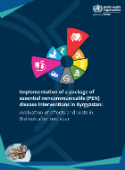Implementation of a package of essential noncommunicable (PEN) disease interventions in Kyrgyzstan: evaluation of effects and costs in Bishkek after one year (2017)

Download
To achieve the global goal of a 25% reduction in premature mortality from the four main noncommunicable diseases (NCDs) by 2025, and the equivalent sustainable development goal of a 30% reduction by 2030, will require action in the prevention and management of these diseases. WHO has defined a minimum set of essential NCD interventions to be implemented in primary health care in low-resource settings in its package of essential noncommunicable (PEN) disease interventions.
In Kyrgyzstan, cardiovascular diseases are responsible for half the number of deaths and are a major theme of the national health reform programme 2012–2016. The country has been operating the PEN protocols for one year, at the end of which WHO carried out an evaluation of their implementation. While it was possible to ascertain the costs incurred in implementation, it was not possible to demonstrate effectiveness. This may reflect the limitations of the evaluation and/or the implementation of the protocols. As scale-up and sustainability of the pilot project are being considered, this report is a timely opportunity for reflection and adjustment of the model as part of the quality improvement cycle.



